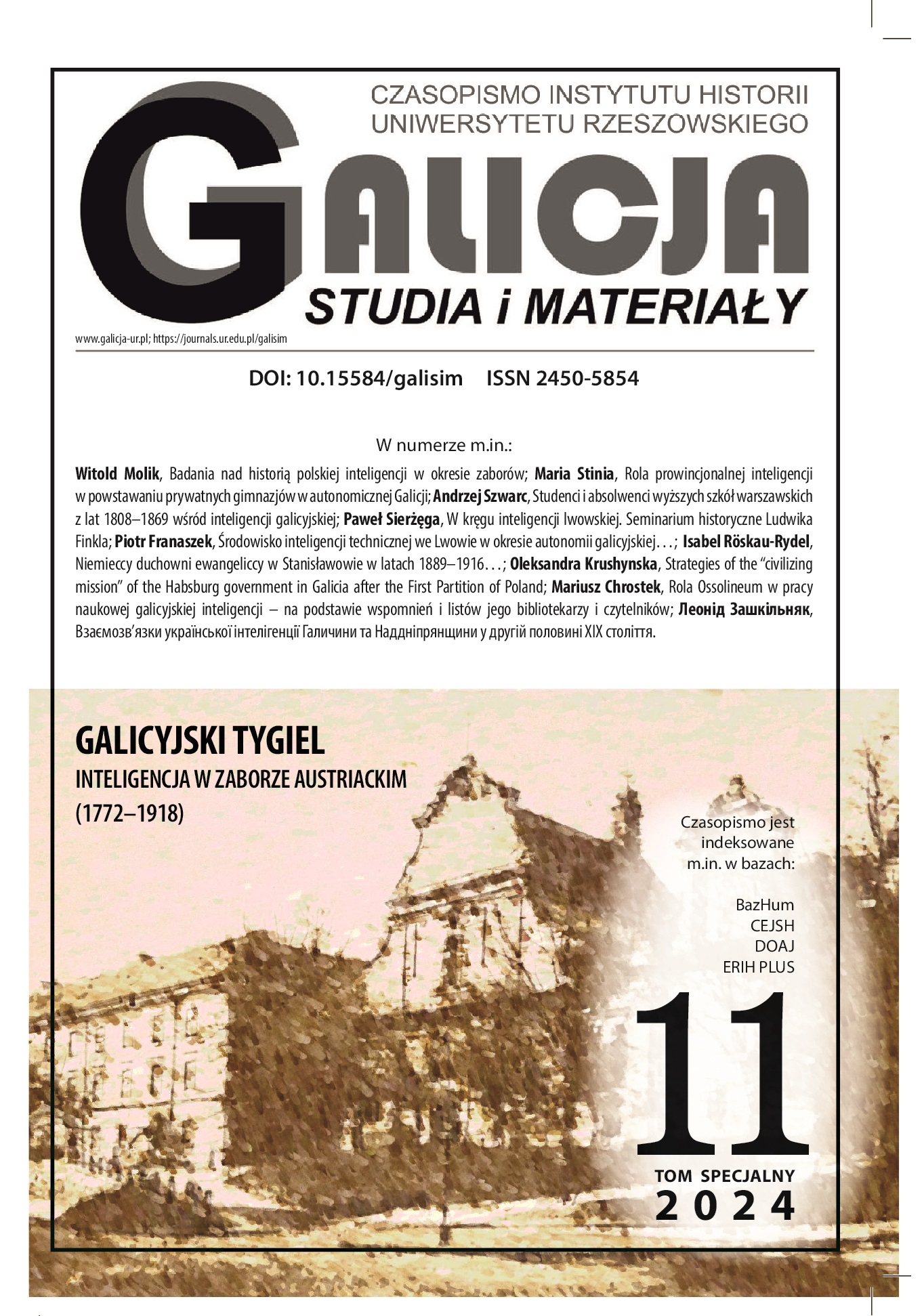Strategies of the “civilizing mission” of the Habsburg government in Galicia after the First Partition of Poland
DOI:
https://doi.org/10.15584/galisim.2024.11.25Keywords:
Kingdom of Galicia and Lodomeria, Habsburg Monarchy, civilizing mission, Enlightened AbsolutismAbstract
The article is devoted to analysis of the “civilising mission” element in plans and strategies of the Habsburg Monarchy in the “Kingdom of Galicia and Lodomeria” during the first years after the First Partition of Poland. The imperial administration created an ambitious plan of reforms and transformations in Galicia, aimed at bringing the population of the province to progress and prosperity in the “Habsburg” sense of these terms and making them model citizens of the empire. In order to examine these plans, the reasons for their creation, and their short-term implementation, the texts of the first patents and orders of the Habsburg government, as well as reports of Habsburg officials employed in Galicia, will be analyzed, with particular emphasis on the “civilizing mission” element of these documents. Since the annexation of Galicia coincided with the popularity of the Enlightened Absolutism philosophy and the implementation of reforms in its spirit throughout the entire monarchy, the influence of this philosophy on the planned transformations in Galicia will also be studied.
Downloads
References
Augustyniak U., History of the Polish-Lithuanian Commonwealth: State-Society-Culture, Frankfurt am Main 2015.
Beales D., Was Joseph II an Enlightened Despot? [in:] The Austrian Enlightenment and its Aftermath, eds. R. Robertson, E. Timms, Edinburgh 1991, p. 1–21.
Brawer A.J., Galizien, wie es an Österreich kam: eine historisch-statistische Studie über die inneren Verhältnisse des Landes im Jahre 1772, Leipzig 1910.
Csáky M., Feichtinger J., Prutsch U., Habsburg postcolonial: Machtstrukturen und kollektives Gedächtnis, Innsbruck : Wien 2003.
Continuatio Edictorium et Mandatorum Universalium in Regnis Galicie et Lodomerie. A die 28. Mensis Junii Anno 1773. Emanatorum, Leopoli 1774.
Czubaty J., The Attitudes of the Polish Political Elite towards the State in the Period of the Duchy of Warsaw, 1807–1815 [in:] Collaboration and Resistance in Napoleonic Europe, eds. M. Rowe, Basingstoke 2003, p. 169–185.
Edicta et mandata universalia Regnis Galiciae et Lodomeriae. A die 11 Septembr. 1772 initae possessionis promujgata, Leopoli 1773.
Fillafer F.L., The “Imperial Idea” and Civilising Missions, „Historyka Studia Metodologiczne; Polska Akademia Nauk Oddział PAN w Krakowie” 2012, vol. XLII, pp. 37–60.
Glassl H., Das österreichische Einrichtungswerk in Galizien (1772–1790), Wiesbaden 1975.
Grodziski S., W Królestwie Galicji i Lodomerii, Kraków 1976.
Haid E., Weismann S., Wöller B., Galizien: Peripherie der Moderne – Moderne der Peripherie?, Marburg 2013.
Judson P.M., The Habsburg Empire: A New History, Cambridge 2016.
Kakanien Revisited, URL: https://www.kakanien-revisited.at/.
Kalinka W., Galicja i Kraków pod panowaniem austriackim, Paryż 1853.
Kaps K., Surman J., Postcolonial or Post-colonial? Post (-) colonial perspectives on Habsburg Galicia, „Historyka Studia Metodologiczne; Polska Akademia Nauk Oddział PAN w Krakowie” 2012, vol. XLII, pp. 7–35.
von Kortum E.T., Magna Charta von Galizien oder Untersuchung der Beschwerden des galizischen Adels pohlnischer Nation über die österreichische Regierung, Jassy 1790.
Koyama S., The Polish-Lithuanian Commonwealth as a Political Space: Its Unity and Complexity [in:] Regions in Central and Eastern Europe: Past and Present, eds. T. Hayashi, H. Fukuda, vol. 15, Sapporo 2007, p. 137–153.
Kudela-Świątek W., Świątek A., The trap of colonialism... The Ukrainians of Eastern Galicia – colonised or colonisers?, „Historyka Studia Metodologiczne; Polska Akademia Nauk Oddział PAN w Krakowie” 2012, vol. XLII, pp. 37–60.
Okey R., Taming Balkan Nationalism: The Habsburg „Civilizing Mission” in Bosnia 1878–1914, Oxford 2007.
Osterhammel J., Europe, the „West” and the civilizing mission, London 2006.
Pacholkiv S., Das Werden einer Grenze: Galizien 1772–1867 [in:] Grenze und Staat. Paßwesen, Staatsbürgerschaft, Heimatrecht und Fremdengesetzgebung in der österreichischen Monarchie 1750–1867, Verf. W. Heindl-Langer, E. Saurer, H. Burger, Wien 2000, p. 518-618.
von Pergen A., Beschreibung der Königreiche Galizien und Lodomerien nach dem Zustand, in welchem sie sich zur Zeit der Revindicirung durch Ihro Kais. Königl. Apostolischen Majestät und besonders im Monat Julius 1773 befunden haben, 1773, AT-OeStA/HHStAHausA Hofreisen, Reisen Kaiser Joseph II., Ktn 5.
von Pergen A., Pro Nota, 30.08.1772, AT-OeStA/AVA Inneres HK Allgemein, Neue Provinzen, Staatsverwaltung, Galizien, Ktn. 229.
Plattner I., Josephinismus und Bürokratie [in:] Josephinismus und Bürokratie, Verf. H. Reinalter, Wien 2008.
Pranzl R., Das Verhältnis von Staat und Kirche/Religion im theresianisch-josephinischen Zeitalter [in:] Josephinismus als aufgeklärter Absolutismus, Verf. H. Reinalter, Wien 2008, p. 17–52.
Prutsch U., Habsburg postcolonial [in:] Habsburg postcolonial : Machtstrukturen und kollektives Gedächtnis, Verf. M. Csáky, J. Feichtinger, U. Prutsch, Innsbruck : Wien 2003, p. 33–44.
Řezník M., Neuorientierung einer Elite: Aristokratie, Ständewesen und Loyalität in Galizien (1772–1795), Frankfurt am Main 2016.
Řezník M., Shaping a New Habsburg Territory [in:] More than Mere Spectacle: Coronations and Inaugurations in the Habsburg Monarchy during the Eighteenth and Nineteenth Centuries, ed. K. Van Gelder, vol. 31, New York 2021, p. 223–246.
Said E.W., Orientalism: Western Conceptions of the Orient. Reprinted with a new afterword, London 1995.
Scott H.M., Reform in the Habsburg Monarchy, 1740–90 [in:] Enlightened Absolutism. Reform and Reformers in Later Eighteenth-Century Europe, ed. H.M. Scott, Basingstoke, Hampshire 1990, p. 145–187.
Szabo F.A., Kaunitz and enlightened absolutism 1753–1780, Cambridge 1994.
Telesko W., Colonialism without Colonies: The Civilizing Missions in the Habsburg Empire [in:] Cultural Heritage as Civilizing Mission: From Decay to Recovery, ed. M. Falser, Cham 2015, pp. 35–48.
Tokarz W., Galicya w początkach ery Józefińskiej w świetle ankiety urzędowej z roku 1783, Kraków 1909.
Vorläufige Anweisungs-Punkten, nach welch sich von Seite des Civilis in Unserm neu occupirten Pohlnischen Antheil zubetragen ist, 30.5.1772, AT-OeStA/Kriegsarchiv Zentralstellen Hofkriegsrat Hauptreihe Akten 901, 28/22 – 29/48, 1772-29-45.
Vushko I., The politics of cultural retreat: imperial bureaucracy in Austrian Galicia, 1772–1867, New Haven 2015.
Wolff L., Inventing Eastern Europe: The map of civilization on the mind of the Enlightenment, Stanford 1994.
Wolff L., The idea of Galicia: history and fantasy in Habsburg political culture, Stanford 2010.
Wyczański A., Polska-Rzecząpospolitą szlachecką, 1454–1764, Warszawa 1965.
Zajączkowski A., Szlachta polska: kultura i struktura, Warszawa 1993.
Downloads
Published
How to Cite
Issue
Section
License
Copyright (c) 2024 Galicja.Studia i materiały

This work is licensed under a Creative Commons Attribution-NonCommercial-NoDerivatives 4.0 International License.



